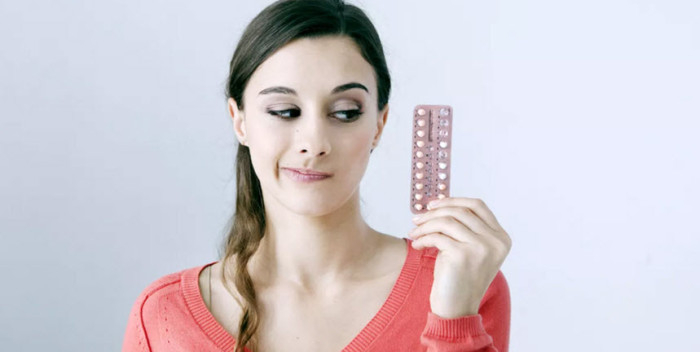Contraceptives: what are their benefits and harms
Modern science provides people with the opportunity to independently regulate the number of children. It is about preventing unwanted pregnancies and contraceptive methods. Condoms, spirals, tablets, barrier remedies - the pharmaceutical market offers a wide range of remedies. This article will tell you about oral contraceptives, how to choose, use and what effect their use has on the body.
Content
Types of contraceptive 
The leading position among the means of preventing unwanted pregnancy take birth control pills. It is easy to take them, they are not expensive, they protect reliably. At first glance, their advantage is obvious. But is it that simple?
There are 2 types of birth control pills.
- combined oral contraceptives;
- mini-drank.
The first ones contain 2 types of hormones - estrogen and gestagen. Mini-pills are composed only of gestagen.
As the name suggests, mini-pills are pills that contain minimal doses of hormones. That is, their effectiveness is slightly lower than that of conventional tablets. But such pills are much milder, so they can be used during breastfeeding and for diseases of the cardiovascular system.
Conventional pills, in turn, are divided into:
- Monophasic - the level of hormones remains unchanged throughout the month. These include Regulon, Lindinet, Janine, Logest, Silhouette.
- Biphasic - the amount of hormones differs in 2 periods of the cycle. For example, Femoston.
- Three-phase - the level of the active substance changes 3 times per cycle. They are less popular, despite the fact that they mimic the natural release of the hormone. They are much worse perceived by the body than the first 2 types. Their name is marked with three - Tri-Regol, Three merci.
The point of birth control pills is that they interfere with the maturation of the egg. Thus, ovulation becomes impossible. Mini-pills, on the other hand, act only on the lining of the uterus. They make it loose, the discharge is viscous, which does not allow the sperm to penetrate to the target.
How to choose contraceptive 
Of course, you can watch ads or listen to a friend's advice. You can, if your health is absolutely not important to you.
To select high-quality contraceptives that are guaranteed to protect against pregnancy and will not cause unnecessary side effects, you must visit a gynecologist. The doctor will conduct a survey, examine your skin, mammary glands. Measures weight and pressure. And based on these data, it will offer you several drugs for your choice that are right for you. It would be better to pass a special test for hormones, this will allow you to choose a 100% suitable remedy.
Remember that, like any other medicine, birth control pills have their own contraindications:
- diseases of the heart and blood vessels;
- poor blood clotting;
- diabetes;
- varicose veins;
- hypertension;
- liver disease;
- migraine;
- smoking- reduces the effectiveness of the drug;
- malignant tumors;
- excess weight;
- pregnancy and lactation;
- age after 40 years;
- diseases of the biliary organs;
- high level cholesterol.
How to drink birth control 
If you start taking oral contraceptives for the first time, then you should start right from the first day monthly... If this is not done, then the first week is better to apply additional protection measures.
When one plate of tablets ends, or it is necessary to switch to another remedy, you need to take a 7-day break. On day 8, start drinking either the next pack or a new product. Please note that some drugs do not have a break in their "program". For example, Jess. These pills use "empty" pills during menstruation, without hormones. This is done for convenience, so as not to get confused.
The tablets should be taken every day, at the same time. Of course, there is no need to set an alarm and take pills every minute. It is best to take the drug in the evening, it is good to eat before that. At first, some women suffer from bouts of nausea. This is caused by hormones and is considered a normal reaction.
If you forget to take another pill, but not yet 24 hours have passed, just take the missed pill. If more than a day has passed, accept 2. Also, if the forgetfulness break is more than a day, it is best to use additional protection.
When you stop taking the drug, the level of hormones in the blood decreases and menstruation begins. Please note that cycle failures may occur after you stop taking. It can both decrease and increase. Failure can occur both in the first month, after the failure, and at 3 or 6. If such a situation occurs, consult your doctor to eliminate the risk of possible illness or pregnancy.
By the way, you can get pregnant after refusing to take hormonal drugs immediately if the course of admission was up to 6 months. The instructions indicate that the body will fully recover in 2-3 months after the completion of the course. But it all depends on the characteristics of the body and the duration of the intake.
Contraceptive harm 
It is worth clarifying right away that correctly selected and taken medications cause minimal harm to the body. If you neglect the contraindications or take an inappropriate drug, then it is possible:
- Vein thrombosis. In cases where there are problems with blood clotting, overweight, air flights or surgery are coming, but you still take the drug.
- Unwanted pregnancy... Incorrectly selected tablets are not very effective.
- Incorrectly selected pills give side effects in the form of nausea, vomiting, and increased blood pressure.
- Suppression of symptoms of polycystic ovary disease. If it is not treated in time, it can lead to infertility.
- Increased susceptibility to HIV infection and chlamydosis.
- Some women report a decline sex drive during the period of taking the pills. But the relationship between these factors has not been scientifically proven.
- Increased blood cholesterol levels. What is the direct "helper" heart attack.
The benefits of contraceptive 
The positive effect of birth control pills on the female body:
- prevention of unwanted pregnancy;
- reducing the risk of ectopic pregnancy;
- alignment of hormonal levels;
- cycle regulation;
- reduction of pain syndrome during menstruation, as well as their duration and intensity;
- unloads the ovaries, give them rest;
- prevention of complications in the female part - cyst, inflammation, tumors, incl. mammary glands;
- regulation of the sebaceous glands, the fight against acne;
- reduction of natural unnecessary hair growth;
- reduce the strength and frequency of "hot flashes" at the onset of menopause;
- refusal of pills causes a sharp activation of the ovaries, if earlier pregnancy did not work out, now it may well happen;
- reducing the risk of other diseases - ulcers, arthritis, asthma.


